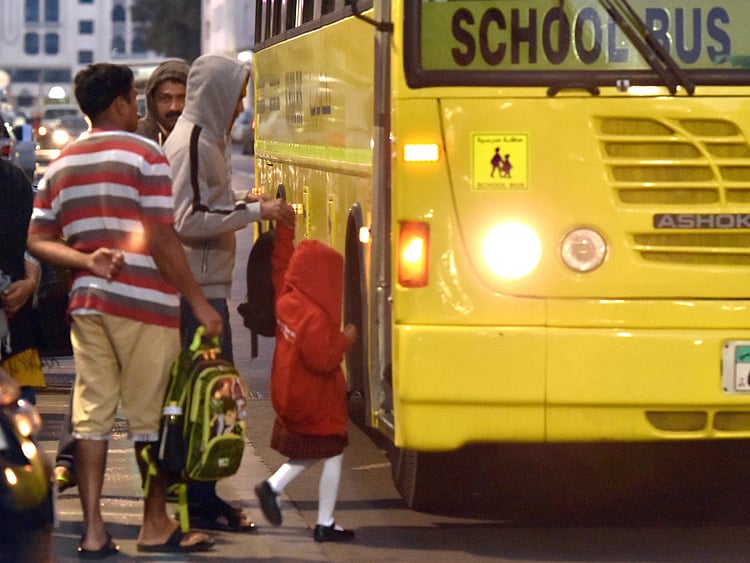Abu Dhabi schools enforce new bus safety and food policies
Schools implement bus safety rules and ban 'Talabat' food ordering service

In coordination with the Department of Education and Knowledge (ADEK), Abu Dhabi schools have established detailed safety regulations for school buses, outlining responsibilities for parents and students alike. With buses serving as the daily mode of transport for hundreds of students, schools emphasized that the journey to and from class is as important as lessons themselves.
School administrations have introduced a comprehensive set of guidelines covering every stage of the trip—from when a student prepares at home, to boarding the bus, arriving at school, and returning home safely. The framework underscores that safety is a shared responsibility between students, parents, drivers, supervisors, and school administrators.
Safety rules begin before the bus departs
Schools stressed that safety procedures start before the morning bus journey. Students are expected to wake up early, prepare their school materials, and carry their bus ID card. They should arrive at the bus stop five minutes before pickup, wait in a safe area away from the road, and avoid playing or wandering off.
When the bus arrives, students must wait until it comes to a complete stop before boarding in an orderly manner, holding onto the handrail while climbing the steps. Once inside, they should sit immediately and fasten their seatbelts where available.
Rules during the bus journey
During the trip, students are required to remain seated until the bus fully stops, maintain cleanliness and order, and refrain from making noise. Blocking aisles, leaning out of windows, or throwing objects inside or outside the bus is strictly prohibited. Students must follow the instructions of the driver and supervisor, and avoid tampering with bus equipment such as first aid kits, fire extinguishers, or emergency exits.
On arrival at school, students are expected to proceed directly to their classrooms without delay or crowding. Schools also regulate designated drop-off and pickup areas, barring other vehicles from entry, while supervisors hand over attendance lists to administrators, who verify that no student is left on the bus.
Communication with parents throughout the day
Throughout the school day, administrations maintain communication with parents, updating attendance records in coordination with bus supervisors and noting any behavioral concerns related to students or drivers.
At dismissal, students gather at designated pickup points, with drivers and supervisors assisting to ensure safe boarding and seating. The same rules apply on the return journey—students must remain seated, keep seatbelts fastened, and avoid pushing or causing disturbances.
Upon drop-off, children under 11 may only cross the road under the supervisor’s guidance, while older students must check for traffic in all directions before crossing. Each student should walk ten steps away from the bus after disembarking to remain visible to the driver, and must not return to the bus if they forget personal items.
Parents, meanwhile, are expected to accompany their children to the bus stop five minutes before arrival, assist them in boarding, and be present to receive them after school, particularly for those under 11. They must also remain available for immediate communication with the school in case of emergencies.
No food deliveries allowed
With the new academic year underway, Abu Dhabi schools have also implemented a healthy food and safety policy approved by the Department of Education and Knowledge (ADEK). Under the policy, unsafe foods—such as items containing allergens like nuts—are banned from school premises, and students are prohibited from ordering food via external delivery services during school hours.
Six core requirements for healthy nutrition
The policy outlines six essential requirements for schools to ensure sustainable healthy food systems:
Healthy food and food safety
Promoting healthy nutrition and food services
Special dietary considerations
Sustainability
Compliance
Accountability
Five key implementation measures
Schools must:
Provide healthy food options
Encourage sustainable eating practices
Adhere to hygiene and food safety standards set by Abu Dhabi’s Food Safety Guide for educational institutions
Apply safeguards during school events to restrict harmful foods
Support inclusion and ensure the safety of students with food allergies or intolerances
The policy requires schools to publish details on their websites, making them accessible to staff, students, parents, and suppliers.
Support for students with allergies
Schools are obligated to maintain records of students with allergies, ensure food labels clearly highlight allergens, and request parents to immediately notify the school if their child develops an allergy, while also providing necessary medications.
Promoting sustainability
Institutions are also required to implement strategies for sustainable food services, such as offering plant-based meals, sourcing local products, reducing packaging, minimizing food waste, and promoting recycling and reusable alternatives.
Penalties for non-compliance
The policy took effect in the 2024/2025 academic year and requires full compliance by the start of the 2025/2026 school year. Schools failing to comply will face legal accountability and penalties under ADEK’s regulations, in addition to potential sanctions outlined in Federal Decree Law No. (31) of 2021 on crimes and penalties and other applicable legislation.
Sign up for the Daily Briefing
Get the latest news and updates straight to your inbox
Network Links
GN StoreDownload our app
© Al Nisr Publishing LLC 2026. All rights reserved.